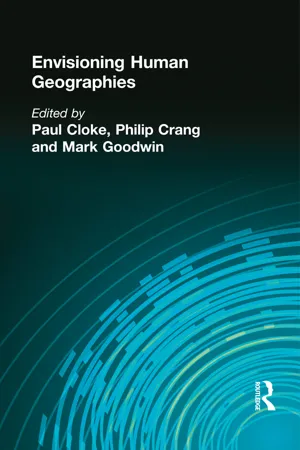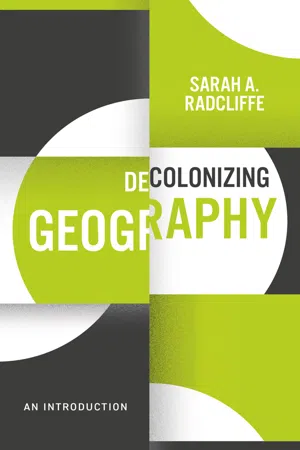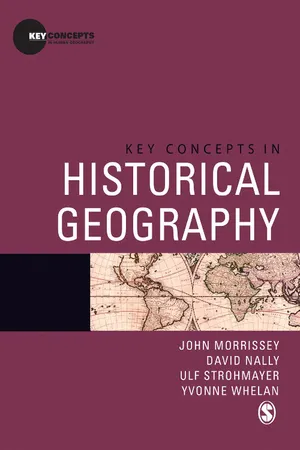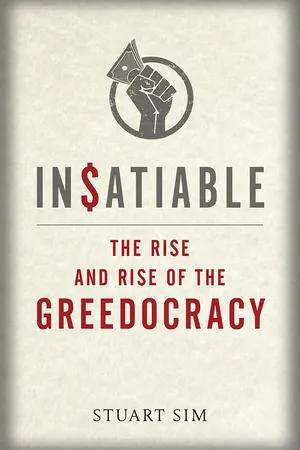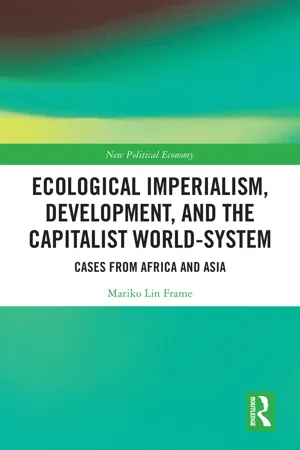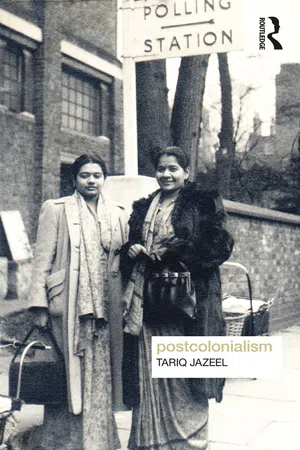Geography
Neocolonialism
Neocolonialism refers to the indirect and subtle forms of control and influence that powerful countries exert over less powerful ones, often through economic, cultural, or political means. It involves maintaining dominance over former colonies or developing countries without the direct imposition of colonial rule. Neocolonialism perpetuates unequal power dynamics and can hinder the self-determination and development of the affected nations.
Written by Perlego with AI-assistance
Related key terms
7 Key excerpts on "Neocolonialism"
- eBook - ePub
- Paul Cloke, Philip Crang, Mark Goodwin(Authors)
- 2014(Publication Date)
- Routledge(Publisher)
Edge of Empire: Postcolonialism and the City , Jane Jacobs (1996) poses one of the most significant questions for contemporary human geography: ‘Can the spatial discipline of geography move from its positioning of colonial complicity towards producing postcolonial spatial narratives?’ (p163). Here she points both to the intimate relationships between geography as a formal academic discipline and European imperialism that have been explored in recent work on the historiography of geography (Barnett, 1998; Bell, Butlin and Heffernan, 1995; Godlewska and Smith, 1994; McEwan, 1998), and looks to the future direction of human geography informed by postcolonial perspectives. This chapter is written with Jacobs’ question in mind. My response is that yes, geography can move towards producing postcolonial spatial narratives, but not in any simple, easy or uncomplicated way. Postcolonial perspectives are important for human geography and geography is important to questions of postcolonialism, but bringing them together is necessarily challenging as well as productive for both. Postcolonialism, as I will argue, destabilises some of the certainties of geography. At the same time, geography differentiates global perspectives on colonialism and directs attention to the materiality of colonial and postcolonial processes, something that has been relatively neglected in comparison to the analysis of colonial and postcolonial writing and visual representations. While the term postcolonial is sometimes used to mark a time period after the end of colonial rule, or to describe the social, cultural and political characteristics of societies shaped by colonialism, postcolonialism describes a complex and debated set of analytical and theoretical perspectives, variously informed by feminist, Marxist, post-structural and sometimes psychoanalytic theories, which critically explore the histories and geographies of colonial practices, discourses, impacts and legacies. Despite the different theoretical tools and focus of interest within this growing interdisciplinary field, its core concerns are the centrality of colonialism to the patterns of global power from the early modern period to the present, and the construction of the identity of the ‘coloniser’ as well as the ‘colonised’ through often racialised ideas of difference. Postcolonialism is both historical and contemporary in its focus, interrogating the historical geographies of colonisation as well as challenging their continued effects in the present. A critical engagement with colonialism and its continued legacies is central to postcolonialism.The impacts of Western imperialism and colonialism have been profound. They include loss of land, livelihoods and lives and the disruption of pre-colonial cultural and social systems. Colonialism involved material processes, knowledges and modes of representation. As Stephen Greenblatt (1988) has written of early modern European encounters with the New World, the ‘possession of weapons and the will to use them on defenceless people are cultural matters that are intimately bound up with discourse: with the stories that a culture tells itself, its conceptions of personal boundary and liability, its whole collective system of rules’ (p64). Colonialism was not just political or economic, but also a cultural process that required legitimation through discourses of difference and superiority, and in which the experiences and identities of colonised people were shaped through damaging forms of cultural as well as political domination (Fanon, 1952, 1967; Nandy, 1983). The histories and identities of colonial powers were also deeply shaped by colonialism. For both former colonies and former colonial powers, the legacies of colonialism live on: in new patterns of ethnicity, racialised inequalities and identity politics shaped by migration from former colonies to former colonial powers; in relationships between indigenous people, descendants of white European settlers and more recent migrants in white settler colonies; in the civil wars and ethnic separatist movements in states brought into being in their modern form through colonialism; in new forms of domination that follow and extend old imperial lines of unequal interconnection. Postcolonialism explores the complex and effective relationships between issues of power, inequality and exploitation and themes of identity, knowledge and representation - eBook - ePub
Decolonizing Geography
An Introduction
- Sarah A. Radcliffe(Author)
- 2022(Publication Date)
- Polity(Publisher)
In some African colonies, colonization was barely accomplished, and resistance movements of varying degrees of organization and institutionalization attended the entire colonial project. In other cases, an organized anti-colonial and nationalist movement came late, accompanied by a rapidly-assembled set of political negotiations [where] the metropolitan power wished to hand over the reins of power with utmost expedience. In others, it took a war of liberation, a bloody armed struggle by leftist guerrillas or nationalist agitators pitted against white settlers or intransigent colonial states. (Watts 2009: 145–6)Decolonization led to the planned or de facto reorganizing of societies and geographies, and yet it remained profoundly unequal. It may have changed the rulers and the flags, but in practice (neo-)colonial rules and hierarchies continued, while economic and political extraction endured. What quickly became apparent was that colonial power and its legacies did not fade after independence, since extractive, violent and ordering patterns had become ingrained in economic relations, socio-racial hierarchies, modes of thinking and the priorities of postcolonial and settler colonial states (Loomba 2005). Colonial-modern rule bequeathed a series of structural and ideological relations that countries have found hard to jettison. Former colonies – and the territories of unrepresented peoples and Indigenous nations – continue to operate under lopsided international relations and global economic systems (Slater 2004). Economic specialization locked in their reliance on global export markets with disadvantageous terms of trade, cemented by unequal relations of labour, migration, aid and investment. Culturally too, metropolitan-oriented relations and identities have shaped religious structures, aesthetics, education and language in these former colonies and territories (Jazeel 2019). Colonialism’s political institutions and ideological structures have proven remarkably resilient, and continue to be characterized by coercion, violence and force. - eBook - ePub
- John Morrissey, David Nally, Ulf Strohmayer, Yvonne Whelan(Authors)
- 2014(Publication Date)
- SAGE Publications Ltd(Publisher)
them. The practices and spaces of colonial violence and anti-colonial resistance in the past not only complicate the story of colonialism but also speak specifically to the current moment of global danger and the dichotomy between its representation and materiality, and the frequent effacement of the latter from mainstream Western media.KEY POINTS• Colonialism can be thought of as an intrinsically exploitative and dehumanizing system of control that relied upon a networking of legal, military and political power.• It is important to not only recognize the import of colonial discourse in the justification of colonialism but also to see its connections to colonial governmentality and practice.• A key role that geography can play in studies of colonialism is to demonstrate the import of locating analyses in necessarily grounded and differentiated ways, and to this end, the concept of the contact zone has been fruitful in sifting out the nuances of colonial encounters.• Political, economic and cultural practices of anti-colonialism ensured the materialization of complex new spaces emerging under the shadow of colonialism.• Historical accounts of the practices and spaces of colonial violence and anti-colonial resistance resonate with and illuminate the current moment of global danger in the colonial present.• Recognizing the echoes of the colonial past in the present has enabled geographers to reveal how global power structures today still mirror the exploitative economic and spatial arrangements of the imperial era.ReferencesBhabha, H. (1994) The Location of Culture. London: Routledge.Blunt, A. and McEwan, C. (eds) (2002) Postcolonial Geographies. London: Continuum.Blunt, A. and Rose, G. (eds) (1994) Writing Women and Space: Colonial and Postcolonial Geographies. New York: Guilford.Clayton, D. (2003) ‘Critical imperial and colonial geographies’, in K. Anderson, M. Domosh, S. Pile and N. Thrift (eds) Handbook of Cultural Geography - eBook - ePub
Insatiable
The Rise and Rise of the Greedocracy
- Stuart Sim(Author)
- 2017(Publication Date)
- Reaktion Books(Publisher)
7 FROM COLONIALISM TO Neocolonialism: THE POLITICS AND GEOPOLITICS OF GREED N ations are every bit as capable of being self-centred and greedy as individuals are, and we need look no further than the history of colonialism for proof of this contention. Colonization is a well-established fact of human existence, and there have been constant movements of peoples from territory to territory in order to gain control of more resources, agricultural and mineral, throughout recorded history. Europe alone yields a host of examples of this phenomenon in premodern times, with migrations from area to area on a regular basis before the concept of national borders, or national sovereignty as we understand it nowadays, came to be established and respected. Even then, there are examples to be cited, such as the Norman invasion of England in 1066. (The Normans were particularly active in this regard, travelling from their original Scandinavian base to colonize countries throughout Europe, from France and England, down as far as Sicily in the Mediterranean.) In the modern period the activity became institutionalized in the form of colonialism, with the major European powers of the nineteenth and early twentieth century competing vigorously with each other to take control of the material resources throughout the lesser developed world that their own rapidly industrializing societies, and national ambitions, demanded. The political motivation in almost every instance was to improve the trading position, and thus the wealth, of the nation, and it was plainly successful in that endeavour until well into the twentieth century. Some colonies exist to this day (if merely a shadow of before). ‘Possessive individualism’ applies to nation states as well, and national self-interest can be just as single-minded as the individual variety, even to the point of going to war to achieve its objectives - eBook - ePub
Ecological Imperialism, Development, and the Capitalist World-System
Cases from Africa and Asia
- Mariko Lin Frame(Author)
- 2022(Publication Date)
- Routledge(Publisher)
The Eco-Neocolonial Relations of Trade and Foreign InvestmentDOI: 10.4324/9780429261305-3The foundation of ecological imperialism is the deep inequality perpetuated by the continued dependency and exploitation of peripheral regions in the capitalist world-system. Few places reflect this as clearly as Africa,1 and much of the literature and media on the endless wars, corruption, and authoritarianism in the continent miss a fundamental point—peripheral nations are characterized by socio-ecologies structured not for the sake of their own populations but for the needs and functioning of the capitalist world-system. From the forcible restructuring of peripheral socio-ecologies under colonialism to the economic pressures of neoliberal globalization, peripheral economies are largely characterized by extractivism. For the rest of the world-system, this has enabled access to a manifold variety of resources. While monetary measurements of international trade and foreign investment flows underestimate the importance of peripheral economies in the world-system, trade and investment nonetheless play a crucial role in providing the raw materials necessary for the workings of the global economy. But for peripheral regions, their integration into the capitalist world-system has led to ecological and monetary debt, environmental degradation, and what scholars have long identified as dis-articulated economies and mal-development.Africa, with perhaps some exception in regard to South Africa, exhibits some of the clearest signs of ecological imperialism in the capitalist world-system, and imperialism, as the African scholar Obeng-Odoom points out, represents one of the greatest threats to African ecological commons. In a time of global ecological crises, Africa plays an increasingly important role as a final frontier of raw materials, land, and water. Africa is also an important destination for the waste of wealthier countries (Obeng-Odoom, 2021 - eBook - ePub
- Marcus Power(Author)
- 2019(Publication Date)
- Routledge(Publisher)
Post-colonialism, geopolitics and the peripheryIntroduction: the changing metageographies of development
The true power of the West lies not in its political and technological might but in its power to define. (Nandy, 1987: ix)The geographer’s “South” is not exactly the same as the “South” in UN trade debates, or the “third world,” or the “less developed countries,” or the economists’ “periphery” or the cultural theorists’ “post-colonial” world, or the biologists’ “southern world,” or the geologists’ former Gondwana – though there is some overlapping along this spectrum… there is enormous social diversity within each; recognizing the polarity is only the beginning of analysis, not the end.(Connell, 2009: 3)THROUGHOUTits history, the complex spatialities of development have often been collapsed down into shorthand geographical imaginations and designations like “the tropics”, the “Third World” and the “Global South” and whilst these practices vary within academic and policy circles (albeit with “some overlapping”) (Connell, 2007, 2009), “disciplinary languages have a history of upholding national boundaries, regional differences, and geopolitical hierarchies” (Levander and Mignolo, 2011: 2). As such, “[i]ntellectual inquiry can all too easily naturalize territoriality” (2). This chapter seeks to critically examine the scripting and mapping of some of the major regionalisations and spatialisations of the non-Western world that have historically guided development theory and practice, such as “the tropics”, the “Third World” and the “Global South”, and explores their (in)significance to theorisation and scholarship in IR and Political Geography.During the emergence of modern Geography as an academic discipline over a century ago a number of schemes were developed that attempted to regionalise the world, at macro as well as sub-national scales (Sidaway et al., 2016). Indeed, the urge to classify and compare has been a founding feature of Geography, remaining a point of departure for the discipline and one that requires further reflection on its origins and fortunes (Sidaway, Woon and Jacobs, 2014: 6). Much of what has travelled under the banner of “comparison” has tended to be “deeply retrograde” (Hart, 2018: 372) but comparison can operate as a means of critical engagement as well as a tool of oppression (Hart, 2018). As Connell (2009: 3) notes, recognising the polarity expressed by terms like the “Third World” or “the South” is “only the beginning of the analysis, not the end”. In seeking to further understand the nexus between geopolitics and development it is first necessary to interrogate the metageographies - eBook - ePub
- Tariq Jazeel(Author)
- 2019(Publication Date)
- Routledge(Publisher)
This introductory chapter does three things: First, it provides a set of interlocking outlines of postcolonialism, in the process historically contextualizing and situating the emergence of postcolonial theory in 1970s literary studies, and in relation to post-structuralism and deconstruction, as well as its antecedent modes of anticolonial writing and politics. By talking specifically through three different ways to conceptualize post-colonialism as an intellectual approach, I gesture towards the traction postcolonial theory has gained in the broad subdisciplinary field of post-colonial geography. Second, I delineate the structure of the book, outlining how the book’s three parts – focusing on Space, ‘Identity’/Hybridity, and Knowledge – provide a useful organizing mechanism through which to narrate the historical and thematic trajectory of post-colonial theory since the late 1970s. Here I also outline the chapters of the book. Third, I outline and expand on three key arguments that run throughout this book and thus collectively constitute something of a statement about postcolonial geography in relation to both the discipline of geography and to postcolonial theory. Briefly summarized, these are that: postcolonial geography should be conceived as methodology, not theory per se; that postcolonial geography is, and should be, at its core concerned with the politics of representation; and finally, that, as per Said’s words above, postcolonial theory has always been an inherently spatial/geographical enterprise.THINKING THROUGH POSTCOLONIALISMS
Since its emergence and establishment as a distinct subfield of literary studies in the late 1970s, postcolonialism – or postcolonial theory – has made a lasting impact across the humanities (in History and Art History notably) and the social sciences (Anthropology, Sociology and Geography). It is field of enquiry whose points of departure of course are colonialism and imperialism. (Where we can think of colonialism as the establishment of colonies by one political power in another space, usually with some kind of extractive relationship involved, and imperialism as a form of power exerted over another space that may not require the actual establishment of colonies.) Notwithstanding the necessary difficulty of defining it, it can be helpful to mobilize postcolonialism as a plural enterprise, and to thus think of a number of different ways that the term has been used in the annals of postcolonial research. In the chapters that follow, I shift between three interlocking and interchangeable mobilizations of the term that I describe as follows.First, and quite simply, the term ‘post-colonial’ (written with a hyphen) is often taken to denote a time period after the end of formal colonial rule. If colonialism implies the physical occupation of territory and resources, and the imposition of political and economic systems and ideologies in those territories (see Sharp 2009, p. 3), then in the European ‘Age of Exploration’ alone (from the fifteenth through nineteenth centuries), Portuguese, Spanish, Dutch, French, Belgian and British colonizers variously enlisted a vast tapestry of methods – some violent, others more coercive – to facilitate their occupations of equally vast swathes of the non-Western world. In the process, colonizers effectively dispossessed Indigenous populations of land and other resources. Mercantile activity, trafficking of slaves, military conquest, the imposition of colonial governments, geographical and scientific exploration, as well as Christian missionary work have all variously supported the colonial designs of different European empires. Much of the non-Western world has at some point been subject to colonial rule by various European powers who sought to secure their own forms of economic and cultural accumulation under the pretence of developing – or as they would have it ‘civilizing’ – the non-Western world. If it is true therefore that much of the world was once colonial, it is also true that much of it is now, temporally at least, ‘post-colonial’; that is to say, formally independent of colonial rule.
Learn about this page
Index pages curate the most relevant extracts from our library of academic textbooks. They’ve been created using an in-house natural language model (NLM), each adding context and meaning to key research topics.
